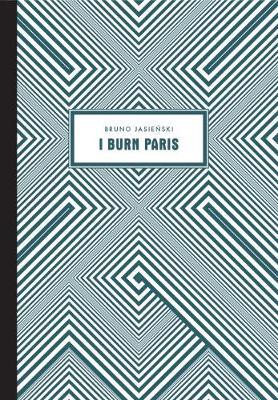Overview
"I Burn Paris has remained one of Poland's most uncomfortable masterstrokes of literature since its initial and controversial serialization by Henri Barbusse in 1928 in L'Humanite (for which Jasienski was deported for disseminating subversive literature). It tells the story of a disgruntled factory worker who, finding himself on the streets, takes the opportunity to poison Paris's water supply. With the deaths piling up, we encounter Chinese communists, rabbis, disillusioned scientists, embittered Russian emigres, French communards and royalists, American millionaires and a host of others as the city sections off into ethnic enclaves and everyone plots their route of escape. At the heart of the cosmopolitan city is a deep-rooted xenophobia and hatred - the one thread that binds all these groups together. As Paris is brought to ruin, Jasienski issues a rallying cry to the downtrodden of the world, mixing strains of ""The Internationale"" with a broadcast of popular music. With its montage strategies reminiscent of early avant-garde cinema and fist-to-the-gut metaphors, I Burn Paris has lost none of its vitality and vigor. Ruthlessly dissecting various utopian fantasies, Jasienski is out to disorient, and he has a seemingly limitless ability to transform the Parisian landscape into the product of disease-addled minds. An exquisite example of literary Futurism and Catastrophism, the novel presents a filthy, degenerated world where factories and machines have replaced the human and economic relationships have turned just about everyone into a prostitute. Yet rather than cliche and simplistic propaganda, there is an immediacy to the writing, and the modern metropolis is starkly depicted as only superficially cosmopolitan, as hostile and animalistic at its core. This English translation of I Burn Paris fills a major gap in the availability of works from the interwar Polish avant-garde, an artistic phenomenon receiving growing attention of late."
Full Product Details
Author: Bruno Jasienski ,
Soren Gauger ,
Marcin Piekoszewski ,
Soren Gauger
Publisher: Twisted Spoon Press
Imprint: Twisted Spoon Press
Edition: New edition
Dimensions:
Width: 13.50cm
, Height: 1.50cm
, Length: 19.50cm
Weight: 0.397kg
ISBN: 9788086264349
ISBN 10: 8086264343
Pages: 299
Publication Date: 02 October 2017
Audience:
General/trade
,
General
Format: Paperback
Publisher's Status: Active
Availability: In Print

This item will be ordered in for you from one of our suppliers. Upon receipt, we will promptly dispatch it out to you. For in store availability, please contact us.
Reviews
Jasieński's apocalyptic vanguardism sees catastrophe as clearing the way for organisation and the plan. ... [His] dialectic of rotting dispersion and tailored compactness traces a fantasy space in which, too often, we still dwell. -- Mute Magazine
Jasienski's I Burn Paris reveals a still largely forgotten moment: post-avant-garde and pre-Socialist Realist. Aesthetically, the moment was a fantastical one: quasi-Surrealist, hallucinogenic, and grotesque. -- Marci Shore, Times Literary Supplement #Jasienski's I Burn Paris reveals a still largely forgotten moment: post-avant-garde and pre-Socialist Realist. Aesthetically, the moment was a fantastical one: quasi-Surrealist, hallucinogenic, and grotesque. -- Marci Shore, Times Literary Supplement It should be emphasized that I Burn Paris is not a programmatic novel. Yes, there's a message here, and an ideology on offer, but Jasienski's expressionistic instincts take over for wonderful long stretches... -- M.A. Orthofer, The Complete Review #It should be emphasized that I Burn Paris is not a programmatic novel. Yes, there's a message here, and an ideology on offer, but Jasienski's expressionistic instincts take over for wonderful long stretches... -- M.A. Orthofer, The Complete Review Jasienski's apocalyptic vanguardism sees catastrophe as clearing the way for organisation and the plan. ... [His] dialectic of rotting dispersion and tailored compactness traces a fantasy space in which, too often, we still dwell. -- Mute Magazine #Jasienski's apocalyptic vanguardism sees catastrophe as clearing the way for organisation and the plan. ... [His] dialectic of rotting dispersion and tailored compactness traces a fantasy space in which, too often, we still dwell. -- Mute Magazine
"""In Soren Gauger and Marcin Piekoszewski's translation, Jasienski's description of a contagion infecting, paralyzing, and eviscerating a large metropolis is vivid, and now feels darkly prophetic."" -- Pasha Malla, The New Yorker ""It should be emphasized that I Burn Paris is not a programmatic novel. Yes, there's a message here, and an ideology on offer, but Jasienski's expressionistic instincts take over for wonderful long stretches..."" -- M.A. Orthofer, The Complete Review ""Jasienski's apocalyptic vanguardism sees catastrophe as clearing the way for organisation and the plan. ... [His] dialectic of rotting dispersion and tailored compactness traces a fantasy space in which, too often, we still dwell."" -- Mute Magazine ""Jasienski's I Burn Paris reveals a still largely forgotten moment: post-avant-garde and pre-Socialist Realist. Aesthetically, the moment was a fantastical one: quasi-Surrealist, hallucinogenic, and grotesque."" -- Marci Shore, Times Literary Supplement"
Author Information
Poet, novelist, and playwright, Bruno Jasienski (1901--1938) was born in Klimontow, Poland. The unquestionable leader of Polish Futurism, his manifestos and poetry were marked by dynamism and absurdity. In 1925, Jasienski emigrated to France but was deported after his novel I Burn Paris was published in 1928. He spent the last decade of his life in the Soviet Union writing in both Polish and Russian. Arrested in 1937, Jasienski was expelled from the Party, put on trial, and sentenced to fifteen years in the gulag, but was executed on September 17, 1938, in Moscow's Butyrka prison.




